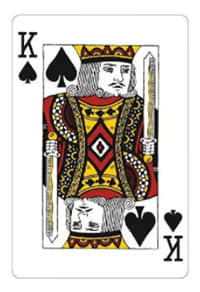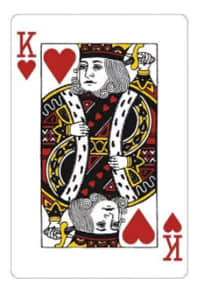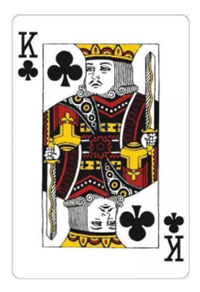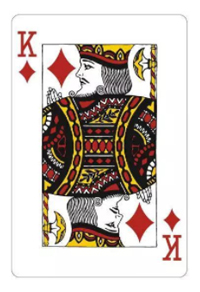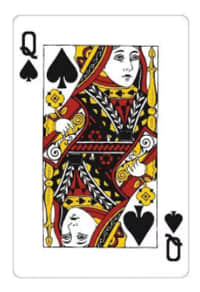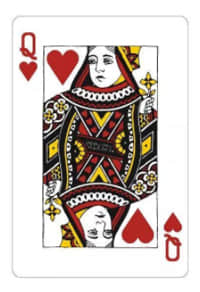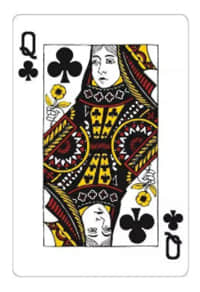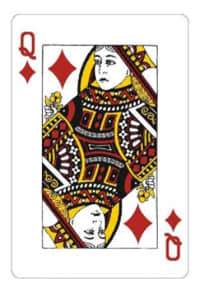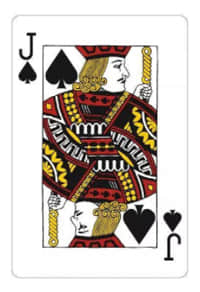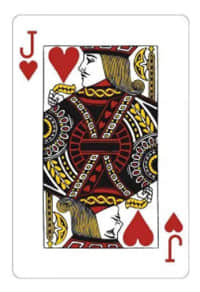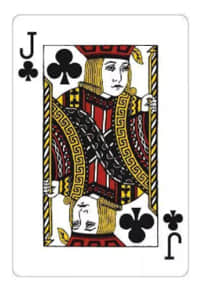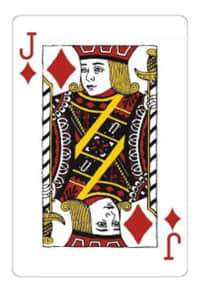Trivia - Representative figures of the face cards in poker
When celebrating the New Year or gathering with friends, the best way to pass the time is to play poker. What do the four types of poker cards, J, Q, K, spades, clubs, diamonds, and hearts, represent?
In fact, each J, Q, and K in the poker card corresponds to the English Jack (servant), Queen (queen) and King (king), and each head card represents a historical figure. Let 8 Xiaobian take you to know which historical figures these 12 head cards represent.
Spade K: King David King of the United Kingdom of Israel
He is David, the father of King Solomon of Israel in the 10th century BC. He is good at playing the harp and wrote many hymns in the Bible, so there are often harp patterns on the King K card, and his hair is curled outwards.
King of Hearts: Charlemagne, King of the Frankish Kingdom (742-814 AD)
He was the founder of the Holy Roman Empire. He established a vast empire that included most of Western Europe. In 800 AD, he was crowned the founding emperor of the Holy Roman Empire by the Pope of Rome. When the portrait was first carved, the craftsman accidentally shaved off his upper lip beard. From then on, the King of Hearts cards were based on this painting. Therefore, only the King of Hearts has a beardless King card with a sword behind his head.
King of Clubs: Alexander the Great, King of Macedonia (356-323 BC)
Ancient Macedonian king, emperor of the Alexander Empire. A famous military strategist and politician in world history. He was resourceful and in just 13 years, he conquered the east and the west with his great talent and strategy. He first established his political status in all of Greece and then destroyed the Persian Empire. On the vast land spanning Europe and Asia, he established a huge empire that stretched from Greece and Macedonia in the west to India and the river basin in the east, from the first waterfall of the Nile in the south to Babylon in the north. He always wore cross jewelry on his clothes, which was a characteristic of the King of Clubs, and his hair curled outwards.
Diamond King: Caesar, a famous Roman general and politician
He was a famous Roman general and politician. The portrait of Caesar on the coins of the Roman Empire was a profile. Since then, among the four King Kings, only the King of Diamonds was a profile, with his hair curled inwards and holding a battle axe to represent power.
Spade Queen: Pallas Athena, the Greek goddess of wisdom and war
Athena, the goddess of wisdom, one of the 12 gods of Olympus in Greek mythology, was also one of the three virgin goddesses, and only he held a weapon among the four queens.
Heart Queen: Judith, the beautiful widow
The story of Judith comes from the Old Testament of the Bible, the Book of Judith, which is the first "honey trap" in history with written records. The Assyrian army besieged Besilia for 34 days. All the Jews in the city were frightened by the brutality of the enemy general Honorificus, and no one dared to go out of the city to fight. Seeing that the city was about to fall, she sneaked into the enemy camp and cut off Honorificus' head. The next day, the Jews hung Honorificus' head on the city wall. Judith's heroic feat of taking the general's head among thousands of troops boosted the morale of the soldiers and civilians in the city, and everyone took advantage of the situation to launch a fierce counterattack against the enemy. The enemy army was in chaos because the commander was gone, and they fled without fighting, and Besilia was saved.
Plum Blossom Q: Argine
Argine is not a person's name. It comes from the European Scrabble game. It is a combination of the Latin word Queen Regina. The queen holds a rose, which means the War of the Roses. The Lancaster royal family in the UK is symbolized by the red rose, and the York royal family is symbolized by the white rose. After the War of the Roses, the two royal families reconciled, and the Tudor dynasty took control of the British throne and tied the roses of both sides together.
Diamond Q: Rachel Jacob's favorite wife
Jacob is the father of Joseph in the Old Testament of the Bible. He had 12 sons and established 12 tribes in Israel. In the 50-chapter Genesis, although Rachel occupies a small space, she leaves a deep impression on people. She is a hardworking, beautiful and beautiful young woman who enjoys a beautiful love. Because of Jacob's sin, she became a victim of his father Laban's trick. She worked hard for 20 years without her husband. When she finally went home with her husband and her husband was no longer a slave, she died of dystocia.
Spade J: Ogier One of Charlemagne's Paladins
The Danish prince blessed by 6 fairies, one of Charlemagne's 12 Paladins, had made great military achievements, but unfortunately died in the battle of the Pyrenees. In fact, he is not a real person. Spade J originally held a spear, but now it has been replaced with a square stick.
Heart J: La Hire, the attendant of Charles VII
La Hire, the French commander in the Hundred Years' War between England and France, is on the heart J. La Hire was also an invincible general who followed Joan of Arc. His name is the old French word for "anger". His famous saying: "Whatever you want La Hire to do for you, you have to do for him; if you are La Hire, you are God." A battle axe behind his back, holding a white ribbon.
Club J: Lancelot, the first warrior of King Arthur's Round Table Knights
Lancelot, the chief Knight of the Round Table in King Arthur's legend, is a great knight known as the "flower of knights". The relationship between Lancelot and King Arthur's queen Guinevere is a typical "palace love". Although the queen deliberately kept a distance from Lancelot, they still walked together. His love affair with Queen Guinevere led to the war between him and King Arthur. He killed all the knights sent by King Arthur to chase him, and his martial arts were the best in the world. But in the end, in order to preserve his reputation, he did not stay with the queen's lover, returned the queen to King Arthur, and became a priest. In poker, he held a spear as recorded in history.
J of Diamonds: Hector, Prince of Troy
Priam's son, the eldest prince of Troy, was the first warrior of Troy and was called the wall of Troy. Not only was he the bravest of the three armies, but he was also upright and noble. He was a very tall heroic image in ancient Greek legends and literature. In the epic "Iliad", he began to lead the Trojans to fight against the Greek army, and finally died in the decisive battle with Achilles.
The above are the prototypes of the characters in the playing cards. Isn't it interesting? You can also share this interesting little-known knowledge with your friends next time you play playing cards!

